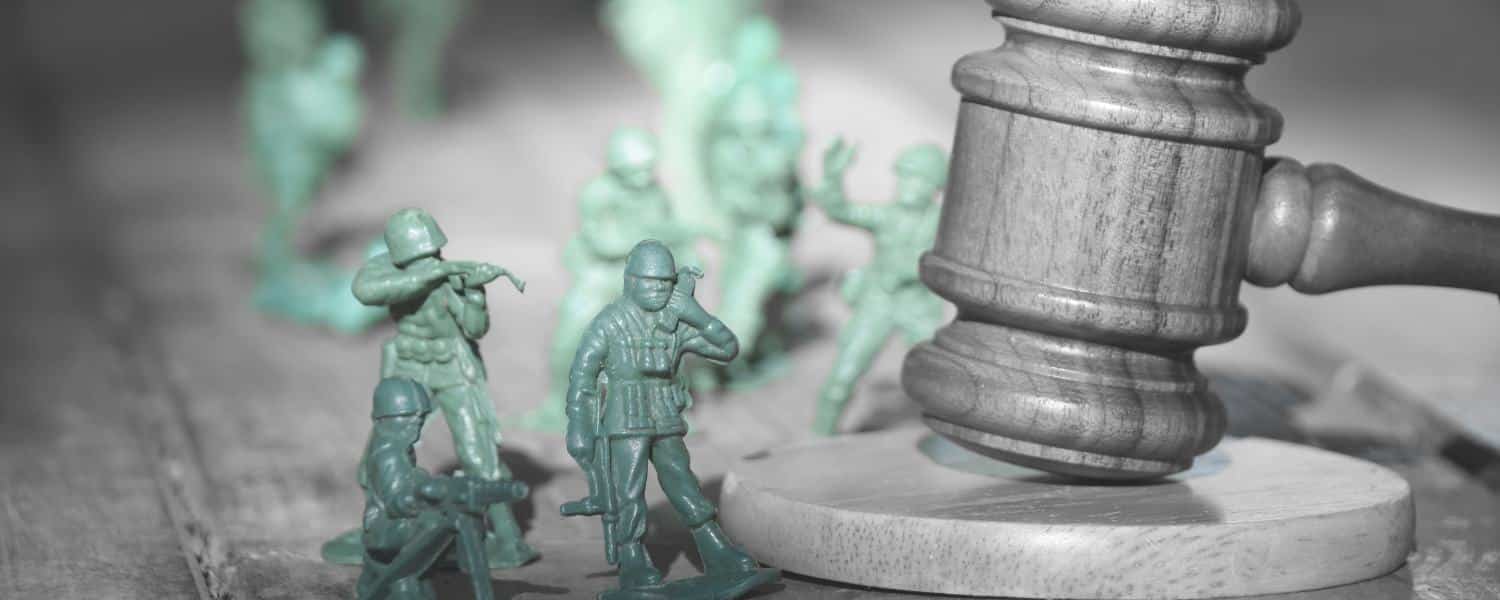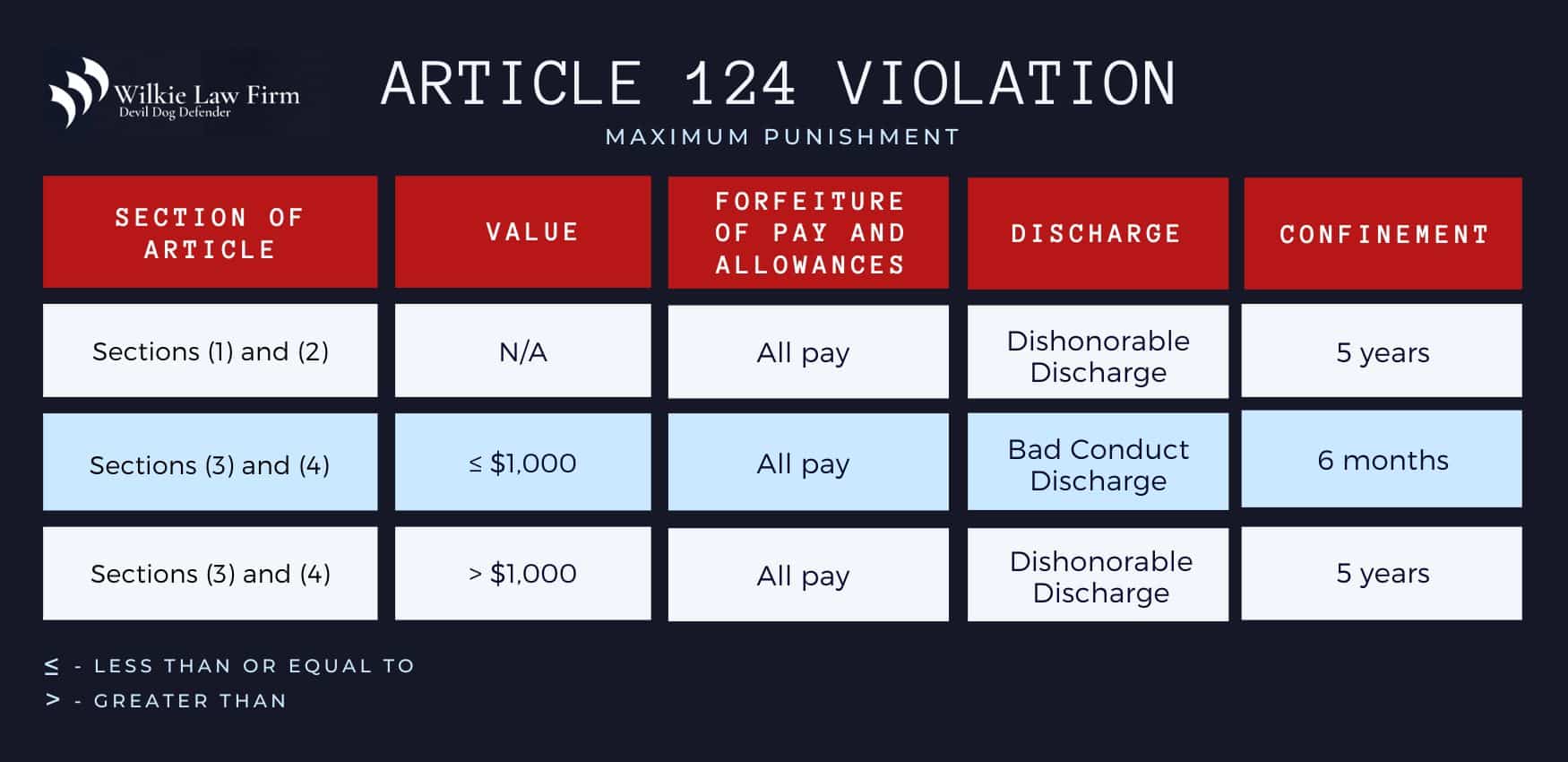UCMJ Article 124
Military Defense Attorney for Article 124 Violations
Home » UCMJ Articles » UCMJ Article 124
Military Counsel
UCMJ Articles
Article 124 of the UCMJ - Frauds Against the United States
Table of Contents
The punitive articles of the Uniform Code of Military Justice are expansive and cover a wide variety of criminal actions for members of the armed forces. This code, also known as the UCMJ, differs significantly from the laws set in place for everyday civilians. In the text below, experienced North Carolina military defense attorney Aden Wilkie of the The Wilkie Law Group explains the charges involving fraud committed against the United States as they are defined in Article 124 of the UCMJ.
What is UCMJ Article 124?
Article 124 of the Uniform Code of Military Justice covers the criminal offense of defrauding the United States Government. The exact text of the statute is as follows:
Any person subject to this chapter –
- Who, knowing it to be false or fraudulent
- Makes any claim against the United States or any officer thereof; or
- Presents to any person in the civil or military service thereof, for approval or payment, any claim against the United States or officer thereof;
- Who, for the purpose of obtaining the approval, allowance, or payment of any claim against the United States or any officer thereof
- Makes or uses any writing or other paper knowing it to contain false or fraudulent statements;
- Makes any oath to any fact or to any writing or other paper knowing the oath to be false; or
- Forges or counterfeits any signature upon any writing or other paper, or uses any such signature knowing it to be forged or counterfeited;
- Who, having charge, possession, custody, or control of any money, or other property or the United States, furnished or intended for the armed forces thereof, knowingly delivers to any person having authority to receive it, any amount thereof less than that for which he receives a certificate or receipt; or
- Who, being authorized to make or deliver any paper certifying the receipt of any property of the United States furnished or intended for the armed forces thereof, makes or delivers to any person such writing without having full knowledge of the truth of the statements therein contained and with intent to defraud the United States; shall, upon conviction, be punished as a court-martial may direct.

Elements of UCMJ Article 124 (Frauds Against the United States)
Making a False or Fraudulent Claim
The elements required for a charge of making false claim under Article 124 include:
- The accused made a certain claim against the United States or an officer thereof;
- The claim was false or fraudulent in certain particulars; and
- The accused then knew that the claim was false or fraudulent in these particulars.
Presenting for Approval or Payment a False or Fraudulent Claim
The elements required for a charge of presenting false claim include:
- The accused presented for approval or payment to a certain person in the civil or military service of the United States having authority to approve or pay it a certain claim against the United States or an officer thereof;
- The claim was false or fraudulent in certain particulars; and
- The accused then knew that the claim was false or fraudulent in these particulars.
Make or Using a False Writing or Other Paper in Connection with a Claim
Under 10 U.S.C. 924, the elements necessary for a charge of making or using a false writing or other paper in connection with a claim include:
- The accused made or used a certain writing or other paper;
- Certain material statements in the writing or other paper were false or fraudulent;
- The accused knew that the statement were false or fraudulent; and
- The act of the accused was for the purpose of obtaining the approval, allowance, or payment of a certain claim or claims against the United States or an officer thereof.
False Oath in Connection with a Claim
Elements of making false oath in connection with a claim include:
- The accused made an oath to a certain fact or to a certain writing or other paper;
- The oath was false in certain particulars;
- The accused knew then that it was false; and
- The act was for the purpose of obtaining the approval, allowance, or payment of a certain claim or claims against the United States or an officer thereof.
Forgery of Signature in Connection with a Claim
In regards to this particular charge, the elements required include:
- The accused forged or counterfeited the signature of a certain person on a certain writing or other paper; and
- The act was for the purpose of obtaining the approval, allowance, or payment of a certain claim against the United States or an officer thereof.
Using Forged Signature in Connection with a Claim
The elements required for the charge of using a forged signature in connection with a claim include:
- The accused used the forged or counterfeited signature of a certain person;
- The accused then knew that the signature was forged or counterfeited; and
- The act was for the purpose of obtaining the approval, allowance, or payment of a certain claim against the United States or an officer thereof.
Delivering Less than Amount Called for By Receipt
Delivering less than the amount called for by a receipt requires the following elements:
- The accused had charge, possession, custody, or control of certain money or property of the United States furnished or intended for the armed forces thereof;
- The accused obtained a certificate or receipt for a certain amount or quantity of that money or property;
- For the certificate or receipt the accused knowingly delivered to a certain person having authority to receive it, an amount or quantity of money or property less than the amount or quantity thereof specified in the certificate or receipt; and
- The undelivered money or property was of a certain value.
Making or Delivering Receipt Without Having Full Knowledge That it is True
To be charged with making or delivering a receipt without having the full knowledge that it is true, the following elements must be present:
- The accused was authorized to make or deliver a paper certifying the receipt from a certain person of certain property of the United States furnished or intended for the armed forces thereof;
- The accused made or delivered to that person a certification or receipt;
- The accused made or delivered the certificate without having full knowledge of the truth of a certain material statement or statements therein;
- The act was done with the intent to defraud the United States; and
- The property certified as being received was of a certain value.
Definitions
Below are important definitions of keywords relating to Article 124 of the UCMJ:
- Claim – A demand for the transfer of money or property.
- Knowledge – The false claim must be made with the knowledge of its “fictitious” or “dishonest” character.
- Making a Claim – Any act placing the claim in official channels.
- Presenting a Claim – When a claim is directly or indirectly presented to someone with the authority to pay it.
- False and Fraudulent – A false or fraudulent claim is one that contains certain material statements that are false and which the claimant knows to have been paid, is not authorized to present the claim, or otherwise has no right to collect.
What is the Penalty for a UCMJ Art. 124 Violation?
If a service member is found guilty of any section of UCMJ Art. 124, they face a total forfeiture of pay and allowances, discharge from the military, and between 6 months to 5 years of confinement. More specifically, the maximum punishment for violating sections (1) and (2) of Article 124 include dishonorable discharge, forfeiture of all pay and allowances, and confinement for 5 years.
Meanwhile, the maximum punishment for the following two sections (2) and (3) depends on the amount of money in question. When the amount is of equal value or less value than $1,000, the service member faces a bad-conduct discharge, forfeiture of all pay and allowances, and confinement for 6 months. When the amount exceeds $1,000 in value, the maximum penalty is dishonorable discharge, forfeiture of all pay and allowances, and confinement for 5 years.

Experienced Military Defense Attorney for Article 124 Charges
Any person subject to this chapter who is found guilty of violating any section of the Article faces harsh consequences and risks losing everything they’ve worked for up until this point. That is why it is so important that those facing charges for Article 124 of the UCMJ obtain the help of a qualified defense attorney as soon as possible.
When you equip the help of The Wilkie Law Group, you ensure that the charges against you are fought aggressively and your rights are protected vigorously throughout the entire duration of your case, from the initial investigation through your court-martial trial. Rest assured, a dedicated North Carolina criminal defense attorney like Aden Wilkie will craft a strategic defense in order to create reasonable doubt surrounding your case and avoid the maximum punishments for your offense.
Not only that, but in addition to creating a strong legal defense and protecting your rights and future, Aden is also happy to provide military record-correcting services as well as military discharge upgrade counsel. Located in Jacksonville, NC, Aden Wilkie services the armed forces at Camp Lejeune and Fort Bragg as well as other bases, camps, stations, and posts across the United States. Call 910-333-9626 today for a consultation or complete our online intake form to learn more.
Contact an Article 124 Counseling Attorney
It is vital to use the knowledge of a seasoned attorney to organize and prioritize the material to present to the command. Call The Wilkie Law Group at 910-333-9626 to arrange your consultation.





